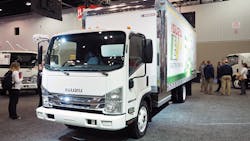When it comes to the viability of commercial battery electric vehicles there are lots of strong opinions on both sides of the issue.
Our recent Guidance Report on Electric Trucks — Where The Make Sense, laid out 10 arguments both for and against CBEVs. Here is a synopsis of the 10 arguments:
- Vehicle tare weight is too high to support my freight needs vs. BEV weight is not an issue
- Technology is not ready vs. BEV technology is proven and here now
- Charging infrastructure is not ready vs. trust the market to provide BEV charging solutions
- Charging Infrastructure is not fast enough vs. trust the market to provide BEV charging solutions
- The electric grid cannot support growth in electric vehicles vs. the grid and market will evolve with BEVs
- Maintenance will be more costly vs. maintenance may be less costly
- Vehicle purchase price is too high for a positive ROI vs. BEVs will be competitively priced
- Vehicle operating costs are too great for positive ROI vs. BEVs will be less expensive to operate
- Vehicle residual value is questionable vs. BEVs will command a premium at resale
- Vehicle life is too short vs. BEVs will last beyond 10 years
If you have not already read the report, I encourage you to do so as it provides more details on each of the arguments, as well as other information on battery electric vehicles in commercial applications.
One important thing to remember is that there is no one right way for every fleet when it comes to determining a CBEV strategy. However, it is important to note that today fleets are already using a mix of diverse technologies in their operations. The future will be no different. The only thing is there will be even more options available — CBEVs being just one of them.
A solution that may work for one fleet could be a disaster for another fleet. Trucking is a complex collection of duty cycles and operating practices. Wanting a simple all inclusive yes or no answer on CBEVs is not possible and it is a disservice to the fleets that constantly look for improvements and know that their own operations differ from their competitors’ operations.
When considering whether CBEVs are right for you, use the same strategy you use for evaluating any new technology and know that even after CBEVs are widely available you still will have diesel powered trucks in your fleet, probably for years to come.
About the Author

Michael Roeth
Executive Director
Michael Roeth is the executive director of the North American Council for Freight Efficiency. He serves on the second National Academy of Sciences Committee on Technologies and Approaches for Reducing the Fuel Consumption of Medium and Heavy-Duty Vehicles and has held various positions with Navistar and Behr/Cummins.
